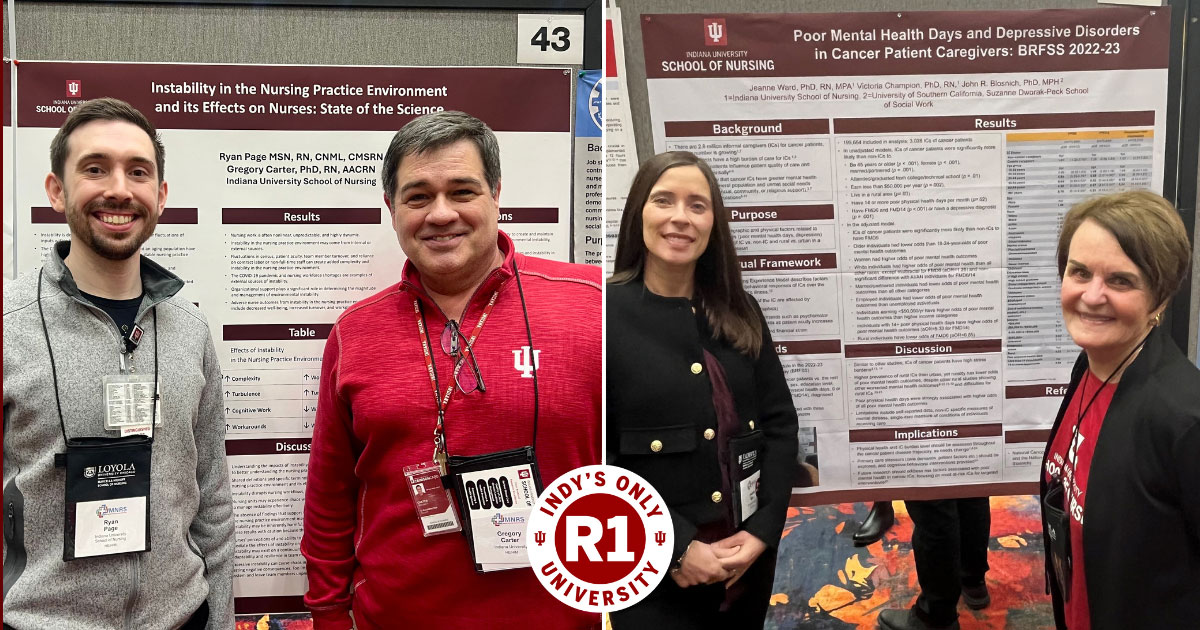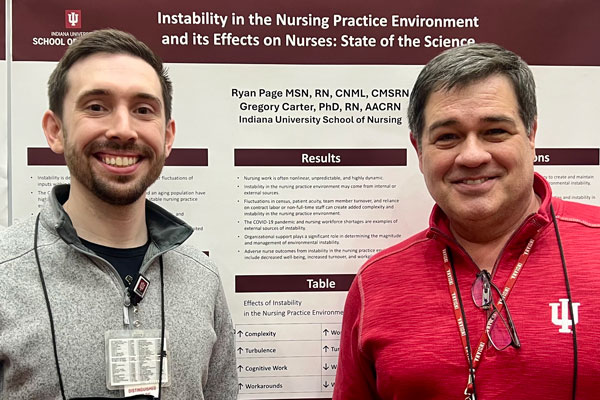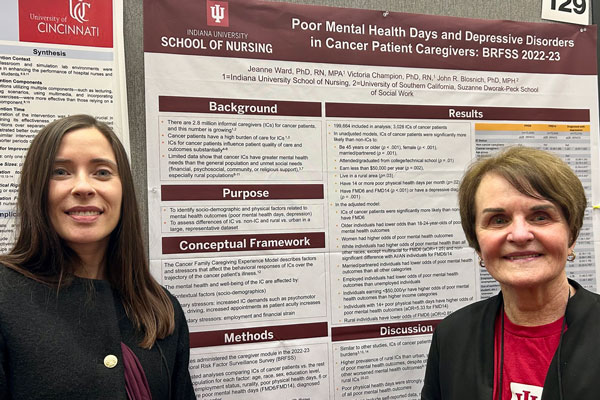Ryan Page was looking for a way to evolve his contributions to nursing research by pursuing his PhD in Nursing Science at the IU School of Nursing. But what he also found was leadership, mentorship, and a valuable opportunity to present research as a poster presenter for the first time at the Midwest Nursing Research Society Annual Conference in Indianapolis.
For Jeanne Ward, PhD, a postdoctoral research fellow at the School of Nursing, she found incredible support from faculty mentors as she makes a return as a poster presenter at the conference for the first time in three years.
“The IU School of Nursing right from the start takes what could be complex for a researcher and make it a much simpler process,” says Page, who holds a Master of Science in Nursing and Health Systems Leadership and a Bachelor of Science in Nursing. “Every professor here is willing to take the time to improve your way of going about research, your thought process and gives you encouragement through what can be the highs and lows of research. Presenting at the MNRS conference is a great opportunity, and I have mentorship to give me confidence for it.”
Ward is relishing a chance to return to the MNRS conference with all she has gained in skills and attributes much of her continued growth to the School of Nursing’s support system.

Research in Action

Page, along with School of Nursing Associate Professor Greg Carter, PhD, MSN, BS, RN, AACRN, did research with an integrative review into how unpredictable changes in the environment affect nurses at the bedside. The research was completed during the PhD course State of the Science, which was taught by Carter and focused on learning how to perform a literature review.
The main findings of their research showed that organizational support plays a significant role in determining how much environmental stability is present in the nursing practice environment, how it’s managed and how that, in turn, affects nurses, Page explained.
“We found different outcomes associated with instability and the nurse practice environment,” he says. “One is increased complexity. Another is increased turbulence, which essentially is the cognitive distraction and the workflow disruption. You are seeing increased cognitive work and an increased amount of workaround to then complete a task. With increased workloads, there is association with increased turnover, decreased work satisfaction and decreased wellbeing.”
For Ward’s research, she focused on the mental health of informal cancer patient caregivers. She was partly inspired to do this work through her own experience as an informal caregiver for a cancer patient and practicing as an oncology nurse in critical care.
“I found when you look at unadjusted models that the caregivers do have a higher prevalence of more poor mental health days and a higher prevalence of depression,” Ward says. Her research looked at the measures of depression, six or more poor mental health days monthly and 14 or more poor mental health days monthly, she says.
“There are many implications from the research for how we design support for these caregivers,” Ward says. “We need to take into consideration their physical needs and their chronic health and incorporate them in more interventions, along with making sure there are more resources overall for informal caregivers.”

During her postdoctoral fellowship with the school, Distinguished Professor Victoria Champion, PhD, MSN, BSN, RN, FAAN, has been her primary mentor, giving Ward frequent meetings for focusing and finding that big-picture perspective.
“Her supportive way, knowledge and experience in all things research has made a huge difference,” Ward says.
“Every step of the way mentors have been fantastic in helping refine my ideas and focusing my research plans,” says Ward, who received a master’s in nursing and PhD from the University of Louisville. “The openness and knowledge mean so much.”
Inspiration in Indianapolis
With the MNRS annual research conference in Indianapolis this year, Page and Ward may not have to leave the state but both researchers hope to be inspired to new states of mind.
“It isn’t just getting a chance to grow in communicating research but getting questions and observations from people engaging with the poster that might improve future research,” Page says.
Ward is also hopeful that engaging with other researchers at the conference can lead to future collaborations and improve her networking circle. She also looks forward to attending sessions to augment her knowledge, particularly related to oncology.
“It’s exciting because you never know what might happen,” she says. “You work hard on your research and then you put it out there. That’s part of the fun.”

